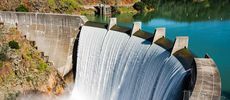EPA Meeting Preview: Small Drinking Water Systems Webinar Illuminates Microbes


How can lab managers better protect their clientele from waterborne diseases? The Environmental Protection Agency (EPA) can help. Their free webinar on July 27, Drinking Water Microbes 102, aims to inform small systems professionals about the microscopic organisms that affect drinking water.
This virtual session is part of a monthly webinar series designed specifically for small drinking water systems and hosted by the agency's Office of Research and Development and Office of Water. Of all the active public water systems in the country and its territories, 95% serve 10,000 people or fewer. The majority of these serve 500 or fewer.
Given that these smaller systems face unique challenges, the EPA provides specialized monthly trainings where participants can learn critical information about the latest scientific advancements, guidance, and best practices. The series also invites small systems professionals to communicate directly with the agency. It's an opportunity to shine a light on problems occurring in individual small systems. The agency then takes those insights and focuses on developing effective solutions.
Advancing Microbiology Knowledge
Of the 139,618 small systems in the U.S., as defined by the Safe Drinking Water Act, many face significant challenges in providing safe, reliable drinking water to customers. Previous EPA webinars tackled such issues as algal toxins, disinfection byproducts control, wildfires' effects on drinking water sources, America's Water Infrastructure Act requirements, emergency response, and Legionella management, issues critical to the lab community. The topic for July 27 is an advanced webinar that updates the Drinking Water Microbes 101 presentation given in May 2020.
In that webinar, Laura Boczek from the EPA's Office of Research and Development covered total coliforms, fecal coliforms, and E. coli. As she explained, "By and large, these indicators have been used throughout the United States for drinking water treatment as efficacy that our treatment processes are working." During the second part of the webinar, Jennifer Best, from the agency's Office of Water, provided a brief history of waterborne disease and spoke about how federal drinking water regulations have evolved over time. Both presenters will return for the second session.
Annual Workshop Approaching
In 2020, the EPA Drinking Water Workshop: Small Systems Challenges and Solutions went virtual for the first time in the annual workshop's nearly decade-long history. The four-day workshop, held in partnership with the Association of State Drinking Water Administrators, included topics significant to the lab community: in-depth training on sanitary surveys, corrosion control treatment, and distribution system and treatment models, plus a wide range of sessions that dug into topics such as pathogens, per- and polyfluoroalkyl substances (PFAS), disinfection guidance, and treatments for extremely small systems.
This year's virtual 18th Annual EPA Drinking Water Workshop is scheduled to begin at 11 a.m. ET on Aug. 30 and run through 5:30 p.m. ET on Sept. 2. The EPA says that a variety of professionals can benefit from attending, including state drinking water agency staff; territory, tribal, and local staff; water system operators; academics; design engineers; technical assistance providers; and consultants.
"The technical sessions of the workshop will include 'Monitoring and Distribution' and 'Source and Treatment' topics such as service lines and premise plumbing, corrosion control, distribution system best practices, cybersecurity, contaminants of emerging concern — including PFAS and algal toxins — and managing contaminants, climate change impacts and resiliency, rule implementation, pathogens and biofilms, disinfection residuals and byproducts, laboratory analytics, environmental justice, and others," the EPA said.
Webinar Details
Microbes 102 is planned for July 27 at 2–3 p.m. ET, followed by an optional 30-minute Q&A. Each webinar usually takes place on the last Tuesday of the month. The one set for October focuses on tribal community water systems. You can sign up to receive email notifications about future webinars through the EPA Research website.
Certificates of attendance are also available for each session. Sign up for notifications for the 18th annual event through the EPA's online registration form.






